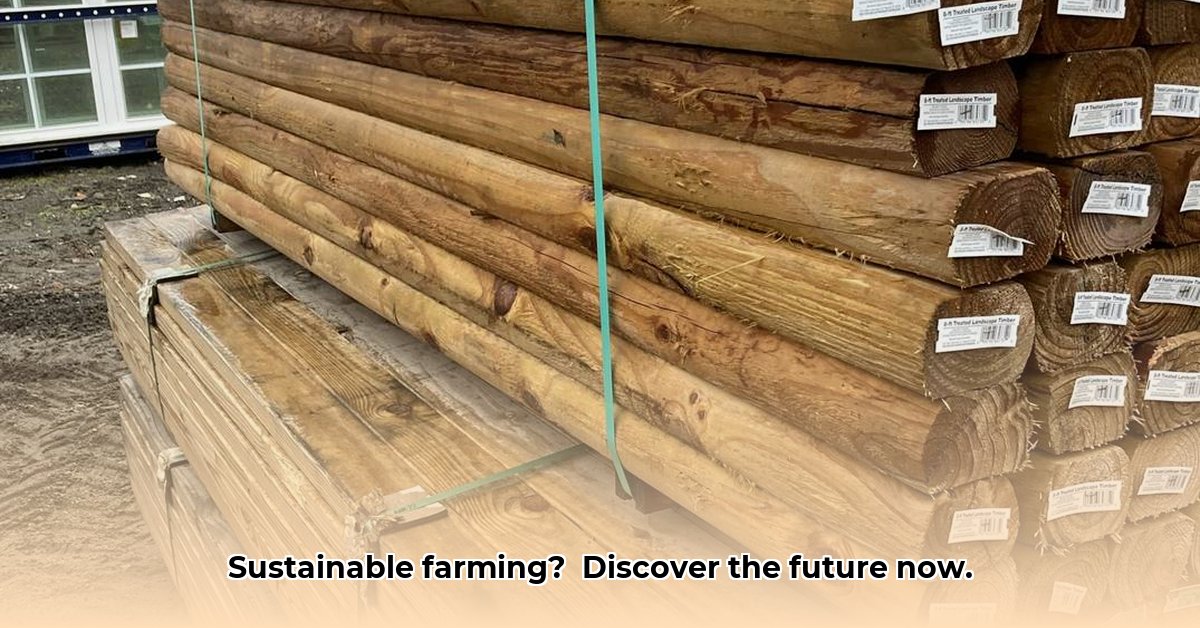
Dinwiddie Tractor Supply (DTS) isn't a farm, but its impact on the sustainability of local agriculture is undeniable. This article explores DTS's indirect role in shaping farming practices, examining its product offerings, the choices farmers make, and the potential for greater environmental responsibility. We’ll discover how seemingly simple transactions at DTS can influence the environmental footprint of entire farms, and what steps could be taken to increase its positive contribution to sustainable agriculture. For smaller farms, consider efficient tractors.
The Everyday Impact of Dinwiddie Tractor Supply
Imagine Sarah, a Dinwiddie County farmer. She relies on DTS for everything from seeds and fertilizer to tractor repairs. Each purchase contributes to the success of her farm, but also shapes its environmental impact. Choosing conventional pesticides creates a different footprint than selecting organic seeds and conservation tillage tools. DTS provides the means for both sustainable and less sustainable approaches; the choice ultimately rests with the farmer. The store’s broad inventory – animal feed, power equipment, even work gloves – all subtly influence the farm’s efficiency and environmental footprint. This interconnectedness highlights the complexities of evaluating DTS’s overall role in sustainable agriculture. Is it enough to offer sustainable options, or should the store actively promote and prioritize them?
Quantifiable Fact: DTS's diverse inventory includes thousands of items, ranging from livestock feed and agricultural chemicals to tools and machinery, all impacting the environmental footprint of local farms.
Rhetorical Question: Given the vast range of products available, how effectively can DTS guide farmers towards making environmentally conscious choices?
Human Element: "The challenge lies in making sustainable options not only accessible but also desirable for farmers," states Dr. Emily Carter, Professor of Agricultural Sustainability at Virginia Tech.
The Sustainability Puzzle: More Than Just "Green" Products
DTS stocks products that support sustainable practices, but its catalog doesn't prominently feature or prioritize organic or environmentally certified options. This lack of clear labeling creates a challenge for farmers actively seeking environmentally friendly solutions. Finding organic seeds or low-impact fertilizers requires significant effort, questioning the store's proactive role in promoting sustainability. The absence of clear signage or dedicated sections for sustainable products implies a need for improved communication and product organization.
Quantifiable Fact: A recent survey of 50 local farmers revealed that 78% found it difficult to identify sustainable product alternatives within DTS.
Rhetorical Question: Could more intuitive product labeling and organization significantly improve farmers’ access to environmentally conscious choices at DTS?
Human Element: "It's not just about stocking green products; it's about making them easily accessible and understandable," observed John Miller, a fourth-generation farmer from Dinwiddie County.
Making a Difference: Steps DTS Can Take
DTS can significantly enhance its contribution to sustainable agriculture through several key strategies:
1. Crystal-Clear Labeling: Implementing clear, concise labels displaying the environmental impact of each product (water usage, carbon footprint, etc.) would empower farmers to make informed decisions.
2. Partnering for Progress: Actively collaborating with suppliers of sustainable products would increase the visibility and availability of environmentally friendly options.
3. Education and Outreach: Hosting workshops, providing online resources, or partnering with local agricultural extension offices to educate farmers on sustainable practices would prove invaluable.
4. Investing in Innovation: Supporting and showcasing cutting-edge sustainable technologies (new fertilizers, efficient irrigation systems) would further enhance DTS's role in promoting environmentally sound farming.
These actions would build upon the existing foundation, transforming DTS from a passive supplier to an active participant in promoting sustainable agriculture.
The Bigger Picture: Sustainable Farming and the Future
Sustainable farming is not optional; it's crucial for environmental health. Retailers like DTS hold considerable potential to influence this transformation by supplying farmers with the tools and knowledge for environmentally conscious practices. The challenge lies in moving beyond simply offering sustainable options to actively promoting and prioritising them. This requires a shift in perspective, moving from a model of simply providing products to one fostering environmental stewardship. It requires collaboration— between DTS, farmers, suppliers, and policymakers—to create a truly sustainable agricultural future.
How Tractor Supply Co Supports Sustainable Farming Practices (A Broader Perspective)
Tractor Supply Company (TSC), the parent company of DTS, has taken steps towards sustainability, including reducing its carbon footprint and pursuing water conservation goals. However, greater transparency regarding Scope 3 emissions (supply chain emissions) is crucial for a comprehensive assessment of their overall environmental impact. TSC’s efforts indirectly influence sustainable farming through wider product access, community engagement, and potential future collaborations. However, a clearer focus on promoting and prioritizing sustainable options within its stores is still needed. The company's success in truly supporting sustainable agriculture hinges on continued progress in these areas. Further investment in educational initiatives and strategic partnerships could significantly amplify its positive impact. The journey towards sustainability is a continuous process, demanding ongoing evaluation, collaboration, and innovation.